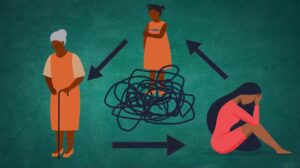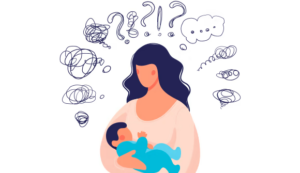In the midst of what should be a joyous and profound moment for a mother—childbirth—a shadow sometimes falls: the often-hidden reality of postpartum depression (PPD). Instead of feeling the expected love and nurturing instinct towards their baby, mothers battling Postpartum Depression often find themselves overwhelmed by feelings of depression, sadness, irritability and anger. This internal conflict, tangled with guilt and self-doubt, intensifies into a heart-wrenching battle, affecting 11-26% women in India.
Sadly, Postpartum depression is a profound and painful reality that demands our empathy and understanding. Despite increasing awareness of postpartum depression (PPD) in India, women are often criticized, with some arguing it is a “modern-day ailment “and fears being labeled as “weak”, it’s a harmful stereotype that silences the struggles of countless women. This dismissive attitude prevents many mothers from seeking the help they desperately need, leaving them to suffer in isolation. Women battling PPD face not only the darkness of the condition itself but also the crushing weight of societal judgment and stigma. Ignoring a condition doesn’t make it disappear, and acknowledging it is the first step towards breaking the cycle of generational trauma. When you have access to information and treatment, you can be the one to pave the way for a healthier future.
Understanding the Impact
Postpartum depression isn’t just about feeling a little down—it’s a complex emotional battle that can immensely affect both mothers and their infants. Research highlights that: mothers suffering with PPD may find it difficult to bond with their newborns, impacting the crucial early stages of their child’s development. Children of mothers with untreated PPD may face challenges in cognitive development, behavior, and emotional regulation, highlighting the importance of acting early and using effective treatments.
Postpartum depression treatment in India typically involves a multifaceted approach aimed at alleviating symptoms and promoting maternal well-being. Mental health professionals, gynecologists, and pediatricians are increasingly recognizing the importance of screening for PPD during and after pregnancy, and helping guide the mothers during this phase of life.
Medication Therapy: Balancing Hormones for Emotional Stability
In cases where symptoms are severe or persistent, doctors may prescribe antidepressant medications during the initial phase of treatment. Selective serotonin reuptake inhibitors (SSRIs), commonly used in postpartum depression treatment in India, help manage hormonal imbalances and chemicals in the brain, easing symptoms of depression and anxiety. However, in India due to cultural beliefs and concerns about medication side effects often influence women’s willingness to pursue such treatments. But, it is ensured that medication decisions are made carefully, considering
Potential risks and benefits for both the mother and her baby during breastfeeding.
Consider Therapy: Explore Therapeutic Options
As mental health stigma gradually diminishes, Psychological interventions are increasingly gaining awareness and support; more women are recognizing the value of seeking professional help making therapy an effective option for postpartum depression (PPD) treatment in India. Therapies such as Cognitive Behavioral Therapy (CBT) and Interpersonal Therapy (IPT) have proven to be particularly effective in addressing the unique challenges of PPD. These therapies provide practical tools to cope with emotions and challenges associated with PPD.
The Importance of Talking It Out
Getting emotional support is a big part of treating PPD in India. Counseling sessions provide safe spaces for moms to talk openly about how they’re feeling, without worrying about being judged. Involving family members in these sessions can make a huge difference too. It helps everyone understand what the mom is going through and how they can help her get better. This kind of support is key to making sure moms feel supported and understood during a tough time.
Support Groups: Finding Strength in Community
Sometimes, we struggle to understand and accept our own feelings and emotions. In India, support groups have become a vital part of treating PPD. These groups bring together mothers who are going
Through similar experiences, helping them realize they are not alone. By sharing their stories and listening to others, mothers find comfort and validation for their emotions. They learn that their feelings are real and that there is a way to feel better. Support groups, led by mental health professionals, offer practical advice, emotional support, and a safe space to talk about fears and hopes. This shared support not only helps each mother recover but also encourages a wider understanding and acceptance of PPD. Through support groups, mothers get the encouragement and tools they need to overcome postpartum depression, making these groups an essential part of PPD treatment in India.
Embracing Hope and Healing
Navigating postpartum depression treatment in India involves a holistic approach that addresses the physical, emotional, and cultural dimensions of maternal mental health. By seeking early intervention and utilizing available resources, mothers can effectively manage PPD and embark on a path towards recovery and well-being.
Remember, seeking help is a sign of strength, and no mother should face PPD alone. Together, we can create a supportive environment where every mother receives the care and understanding she deserves.
How can CoachForMind help?
Licensed Psychologist: We are a team of licensed RCI-registered clinical psychologists. Our team has best practices for panic attacks treatment in India
Tailored Solutions: We at CoachForMind understand the individual need which is why we offer client-centric one-on-one therapy.
Proven Techniques: Our approach to therapy is grounded in scientific research such as Cognitive behavioral therapy and Dialectical behavioral therapy. These therapies are designed for people who experience intense mood swings. These therapies help people who have potentially destructive or harmful behavior.
Commitment to Excellence: We are dedicated to delivering the highest quality of service and continuously improving our offerings based on feedback and emerging trends. Our therapists regularly up skill themselves as per the new norms.
For more information please visit our website or contact us directly at coachformind@gmail.com




